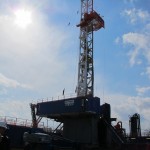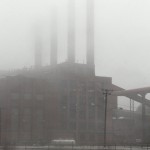DEP Attempted To Suppress Controversial Study That Criticized Shale Gas
-
Marie Cusick
A state report outlining how climate change will impact Pennsylvania is currently a year and a half late — and there’s still no indication of when it will be released publicly.
The Department of Environmental Protection missed its legally-mandated deadline to publish the report in the spring of 2012.
Today at a meeting of the DEP’s Climate Change Advisory Committee, the department said the report is still going through the review process.
However StateImpact Pennsylvania has obtained a copy of the original draft climate report and internal DEP emails, which reveal an attempt by its Policy Office to suppress controversial research that questions the benefits of natural gas.
Methane study stirs debate
The DEP’s Policy Office wanted a team of Penn State scientists who authored the climate report to remove all references to a 2011 study from Cornell University.
The peer reviewed paper, by professor Robert Howarth, has been the subject of intense debate. It concludes that from a climate change perspective, natural gas is dirtier than coal.
Although natural gas is much cleaner-burning than coal when it comes to carbon dioxide emissions, methane can leak throughout the gas production process.
Methane is the primary component of natural gas, and it’s 20 times more potent than carbon dioxide as a greenhouse gas (although it remains in the atmosphere for a much shorter time period).
Howarth believes this methane leakage negates any climate change benefits derived from burning natural gas.
His work has has been criticized by the oil and gas industry and challenged by other scientists including his colleagues at Cornell.
Missing climate report
Despite this debate, the Penn State scientists believed Howarth’s study was worth mentioning as part of the ongoing scientific discussion about methane emissions.
They also cited three other studies that challenged his conclusions.
Here’s part of their original climate change draft report, which was submitted to the DEP in February 2012:
Under scenarios where large amounts of methane are vented, or fugitive methane emissions from the gas transportation system are high, the life-cycle climate impacts of natural gas power generation may be on par with coal-fired power generation (Howarth, et al., 2011). This conclusion also rests on assumptions regarding the timing of climate impacts over which there is additional uncertainty. Three other studies (Jiang et al., 2011: NETL, 2011: Cathles, 2011) question the assumptions by Howarth…
The report’s lead author, Penn State professor James Shortle, declined to comment for this story.
One of the report’s co-authors Seth Blumsack, an associate professor at Penn State, says he viewed his job as simply laying out the scientific debate to the public.
“My role in this was to provide information on the current state of the science, including areas where there is some disagreement,” he told StateImpact Pennsylvania.
Emails show effort to suppress study
A few months ago, DEP’s Climate Change Program Manager quit his job out of frustration.
Joe Sherrick was charged with overseeing the process of producing the report for the agency. He did not comment for this story but has previously told StateImpact Pennsylvania there was a “lack of support” from the Corbett administration and the DEP for anything related to climate change.
A few months after the Penn State team submitted its original draft, the DEP Policy Office directed Sherrick to take Howarth’s work out of the report.
Sherrick relayed the message to the Penn State team in a May 21, 2012 email.
“Our Policy Office is rather firm that on Page 100 of the report they want no reference to Professor Howarth,” he wrote to Shortle.
A few weeks later DEP policy specialist Jessica Shirley pressed the point again to Sherrick in an email.
“Please ensure that all references to Howarth are removed,” she wrote.
The Penn State team responded to the DEP the same day.
“This is kind of tough ground for me because I believe our job is to provide you with the relevant science,” Shortle wrote to Sherrick, “It raises ethical issues to be asked to remove peer reviewed work if we believe providing it is appropriate. I know you know that.”
Sherrick agreed with the Penn State scientists and appealed to the Policy Office a few days later.
“This section [of the report] does nothing more than cover the differences of opinion among current researchers and study” he wrote to Shirley in an email, “It does not advocate right or wrong but instead shows where the preponderance of researchers are on the topic. I don’t believe it should be withheld…”
Drafts of the climate report and internal DEP emails were obtained by the environmental group, PennFuture through an open records request and shared with StateImpact Pennsylvania.
“I didn’t want anything controversial”
Jessica Shirley, the DEP policy specialist who asked for the study to be removed, says it was her own judgement call, and she was not pressured by anyone above her.
“We ended up not taking it out,” she tells StateImpact, “[Howarth] will be in the final assessment report.”
Shirely says the reference will remain to show the current debate.
Although she has no formal scientific background, she says she still doesn’t believe the study is accurate.
“At the time, we were really trying to refute it,” Shirley says, “It was so controversial. I didn’t want anything controversial in there.”
She doesn’t know when the report will be published.
For his part, Howarth is pleased to hear his study will still be mentioned in the final report, but is disturbed by the attempt to suppress it.
“It’s really horrifying,” he says, “I’m not surprised that there’s political pressure to interfere with the scientific process, but I think that’s really damaging to society in the long term. You need to have agencies put forward the best information they can.”
Scientists say more data is needed
The back and forth over the Howarth study lead the Penn State team to add a new section to the report describing the uncertainties around how natural gas will impact the climate.
Here’s a portion of the new section:
Life-cycle comparisons of greenhouse-gas emissions from the natural gas sector are subject to uncertainties due primarily to lack of data, but also due to other modelling assumptions … Howarth et al. (2011) assume high levels of [methane] and fugitive emissions; these estimates are viewed as unrealistically aggressive by other studies (Jiang et al., 2011; NETL, 2011; Cathles, 2011). Direct measurement of [methane] venting and fugitive emissions is rare and expensive. The recent study described by Tolleson (2012) based on measurement of a gas field in Colorado, finds that methane releases to the atmosphere are more in line with Howarth, et al. (2011) than with other studies.
While the Colorado study represents only a single data point, it is suggestive of the high degree of uncertainty that exists in current estimates of direct methane releases from natural gas drilling.
After seeing the new section, Sherrick emailed the Penn State team to say he thought it was a “good discussion.”
“I suspect it will not be well received within our policy office, but please incorporate and format this into the final version,” he wrote, “I’ll deal with our policy office.”
Other scientists agree more data is needed.
Colm Sweeney studies greenhouse gas emissions for the National Oceanic and Atmospheric Administration (NOAA) in Boulder, Colorado.
He and a team of scientists recently took measurements with an airplane over a gas field in Utah and found on one day the gas field leaked 6 to 12 percent of the methane produced (which is on the higher end of Howarth’s leakage rates).
Sweeney stresses that this only represents one gas field and and one day of data.
“We need a lot more measurements to say methane leakage is a national problem,” he says.
The federal Environmental Protection Agency recently slashed its estimates of how much methane is being emitted by oil and gas production, citing tighter controls by the industry.
However the EPA’s own internal watchdog issued a report earlier this year saying the agency needs to get better data to track air emissions from oil and natural gas operations.


















